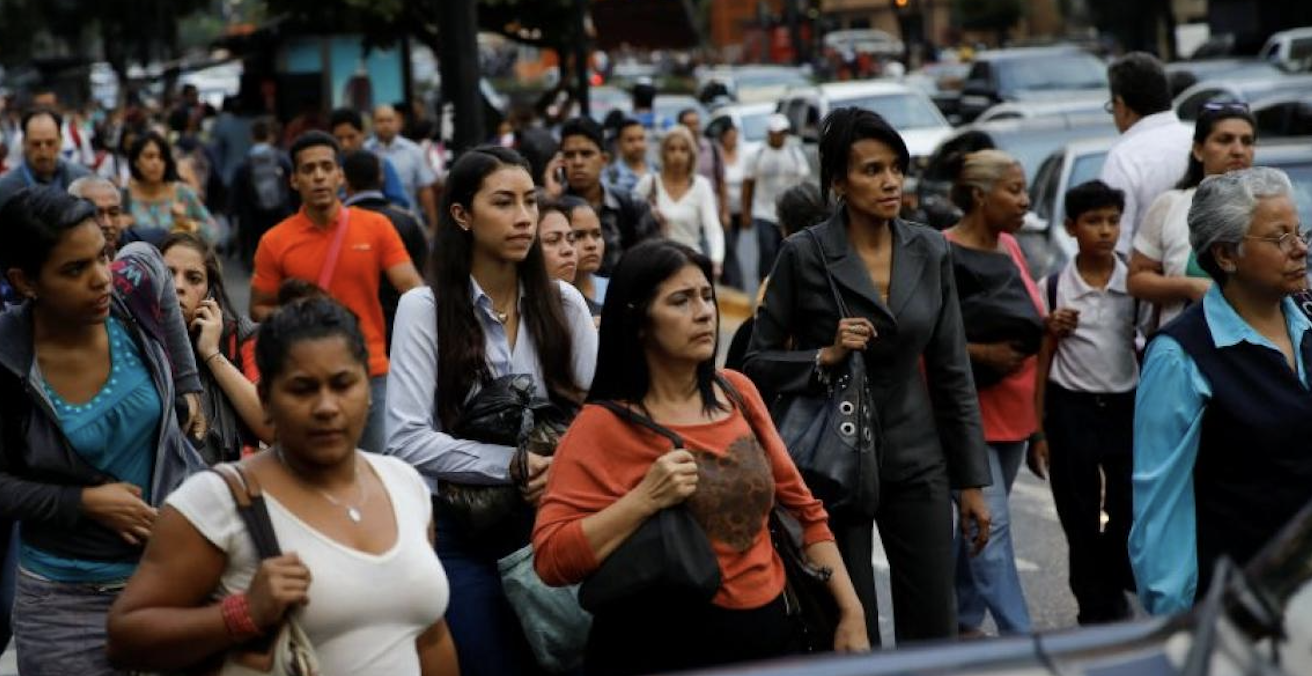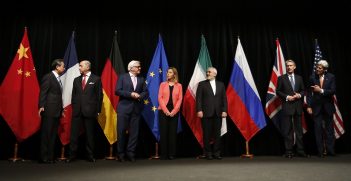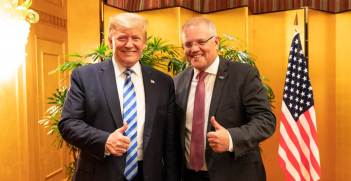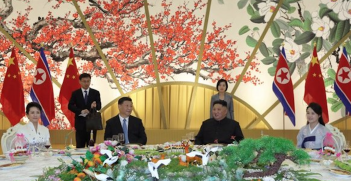The Catastrophic Hard-Line Approach to Venezuela

The failed coup attempt by Juan Guaidó in Venezuela on 30 April drew worldwide attention. But his actions and his recognition as interim president by states opposed to the Maduro government are further entrenching political divisions within the country. Meanwhile, the biggest victims of the oppressive sanctions imposed on the country by the United States and its allies are the Venezuelan people.
Millions of Venezuelans are currently living extremely precarious lives due to economic crisis. This is a situation that is becoming increasingly worse as a result of the draconian sanctions imposed on the government of Nicolás Maduro by the United States and a handful of its allies. The economic sanctions constitute an unethical collective punishment of mass dimensions against Venezuelans of all political inclinations. They are also backfiring as a mechanism of political pressure and will most likely fail to accomplish the political goals they aim to achieve. Their advocates have profoundly misunderstood the balance of forces within Venezuela and miscalculated the strength of sovereign sentiments amongst its population.
The fact the US government is promoting these sanctions is a symptom of the disorientation that currently underscores its foreign policy. It also signals the US government’s distrust of the political capacities of its allies within Venezuela’s opposition movement.
When President Donald Trump was running for office, analysts cast doubt on the extent to which his bellicose rhetoric could gain substance should he reach the White House – something that was initially seen as a pipe dream. But nowadays, there is little doubt President Trump is willing to place his troops where his mouth is. The concern is that if his plans to destabilise the Maduro government keep failing, he may well seek military intervention in Venezuela. Currently, the Caribbean country continues to erode US influence in Latin America and to weaken its traditionally favourable access to Latin American markets and natural resources.
As such, it is unsurprising the Trump administration is implementing such a hard-line approach towards Venezuela. However, it is more difficult to understand why some European and Latin American countries are so readily following US dictates on this front.
In January, the Trump administration officially recognised opposition leader Juan Guaidó as the Venezuelan president, just minutes after he self-ascribed the title in a public square in Caracas. Such speedy recognition was understandable: it evinced the close support Guaidó had received from members of the US government and was in line with the unilateral approach to international relations President Trump continues to cultivate. But what came afterward was less predictable: representatives of several other governments (currently more than 50) followed suit, recognising Guaidó with the aim that this would pave the way to a “political transition” (that is, regime change) in the country.
The size of their miscalculation is evident: four months later, there are no tangible traces of the so-called interim presidency and the enthusiasm opposition supporters initially projected onto this new leader is rapidly transforming into yet another demoralising disappointment. Guaidó is not affecting any change and his repeated calls to make “the final effort” on the streets to oust Maduro have eroded the faith and energies of many opposition supporters.
In direct contrast, Maduro’s government has recovered a capacity to mobilise Chavista supporters (those who ascribe to the unique Chavismo ideology of former Venezuelan President Hugo Chávez) in the name of Venezuelan sovereignty; many of these supporters would be unwilling to demonstrate on the streets in support of the government if international pressure had not reached the tones of intervention that it has recently.
Some of the countries that have followed the United States in this hard-line approach are starting to realise the consequences of their decision. For example, the Spanish government, who decided to back Guaidó, has endangered the economic interests of Spanish investments in Venezuela. The decision has also translated into a deterioration of Spain’s public image among many Latin Americans, who are generally very zealous of sovereign principles. Spain and the other governments that have recognised Guaidó now also appear to be bearing responsibility for the catastrophic consequences the Trump administration’s sanctions have generated among the Venezuelan population.
The recognition of Guaidó also has other very negative political implications for the stabilisation of democracy in Venezuela. It constitutes a heavy blow to the options for political negotiation between opposing factions and has spoilt the efforts of previous international mediators (including those led by former Spanish Prime Minister José Luis Rodriguez Zapatero) who have worked to find a peaceful resolution to the political confrontation. It has also eroded the standing of important opposition leaders who continue to support electoral politics as the only plausible avenue to build a peaceful and prosperous future for Venezuelan citizens. These leaders only learned about Guaidó’s plans (who represents the radical wing of the opposition) when the media started to cover his self-declaration as interim president. This demonstrates the unilateral nature of Guaido’s pronouncement and also the degree of division within the opposition ranks.
Guaido’s actions make the Venezuelan government far less inclined to concede any share of institutional power to the opposition. Furthermore, international recognition of Guiadó was read by the Maduro government as final proof the Chavistas cannot expect any recognition from their political enemies, who they see as having now abandoned the logic of political rivalry. After Guaidó’s pronouncement, President Trump appointed Elliot Abrams as “special envoy for Venezuela.” Such a move no doubt confirmed the suspicions of the Maduro government. In Latin America, Abrams association with covert “dirty-war” operations on the continent during the administration of President Ronald Reagan is still seen as evidence the United States disregards human rights in the implementation of its foreign policy.
Officials from the Trump administration have essentially presented two options to Maduro: either abandon office and leave the country or be eliminated. The fact that many Chavista supporters have closed ranks with Maduro is a reflection of what they feel about such an overt threat: they are being told there is no room for them in Venezuela, and thus their distrust towards opposition leaders such as Guaidó becomes absolute.
Recent events reinforce this analysis. On 30 April, in a poorly planned and executed coup attempt, Gauidó and a handful of officers and soldiers blocked a highway that crosses Caracas. This time Guaidó appeared in the company of Leopoldo López (the previously imprisoned leader of the Voluntad Popular party), who had just been freed from house arrest by a group of dissident police officers. The mutiny was initially pitched by Guaidó as a wide-ranging civil and military uprising that was to bring an end to Maduro. The event filled the newsrooms of international agencies with a new set of exciting images but ended up as a spectacular failure for the opposition. It was controlled by the government with minimal effort and did not mobilise the military or civilians beyond some affluent sectors of Caracas and a few other cities. Guaidó’s legitimacy is fading and López is now holed up in the Spanish embassy. The Venezuelan judiciary has ordered López’s arrest, but Maduro’s government would probably not mind letting him go into exile as it would be one less threat to worry about.
The repeated threats to Maduro’s government and his supporters represent a clear failure. In conjunction with the economic sanctions, they are also devastating for the prospects of democratic stabilisation in the country. They close all options for a negotiated resolution of political differences and foster a continuous state of political fear that furthers the concentration of power in the executive. Such tactics are also cultivating increasing distrust and anger among all actors in the Venezuelan arena.
It is difficult to envisage the Trump administration and its allies altering their approach at this stage, but such a change is the only way to establish the grounds for peace and democratic stability in Venezuela.
Dr Luis Angosto-Ferrández is a senior lecturer in Anthropology and Latin American Studies at the University of Sydney. He is the author of “Venezuela Reframed,” editor of “Democracy, Revolution and Geopolitics in Latin America: Venezuela and the International Politics of Discontent” and co-editor of “The Politics of Identity in Latin American Censuses.”
This article is published under a Creative Commons License and may be republished with attribution.





